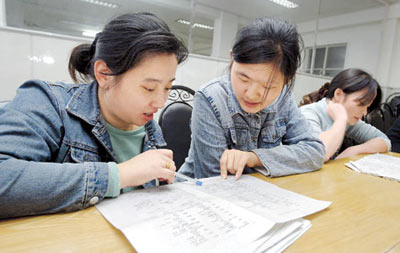| Home / Education / Photos | Tools: Save | Print | E-mail | Most Read |
| No English, No Sales |
| Adjust font size: |
If store owners and tailors at a south Bund market want to sell their beautiful fabrics and custom-made suits, they must speak English - so they go to class every Friday at 6 PM.
"Hello." "Ni Hao." Frank Liu, owner of a little fabric store, welcomes his next customer Marie in English. At the same time, Marie, a French expat who has lived in "May I help you?" Liu continues to surprise the French guest with his English. After Marie says she wants to order two business suits, Liu fluently explains the differences between various materials in English. "His English is much better than my Chinese," Marie says. "He knows words like 'heavy weight' and 'light weight,' and he knows his products very well." Liu is delighted to hear this. "I have been studying business English in the class organized by the market for a month," he says. The market is the Shanghai South Bund Soft-Spinning Material Market. It was moved from the Dongjiadu Fabric Market, just 500 meters away. Trial operation of the new market started in April and it officially opened on October 20. While the recently closed Xiangyang Fashion and Gift Market was a famous bazaar to find up-to-date consumer goods, the Dongjiadu Fabric Market has been a favorite spot for those seeking custom-tailored suits and dresses. The Shanghai South Bund Soft-Spinning Material Market inherited from Dongjiadu the rich collection of fabrics of all kinds and handy tailors who can turn out made-to-order suits and dresses in a day or two. Moreover, the indoor market is larger with better facilities. However, one problem became apparent during trial operations - lack of English speakers, says Shan Shiming, from the market's management office. "Before moving indoors, there were only a few foreign customers. Now, possibly because of improved facilities, more than 60 percent of the customers are foreigners," Shan explains. Although a few shop owners knew a little English, most spoke none. "If you can't speak English, the foreigners just go to someone else. So basically, no English, no sales," says Shan. The management team and the Dongjiadu neighborhood organized the business English class especially for the shop owners. Advertised only once on October 20, the class was soon filled by enthusiastic store owners. Due to limited classroom space, those who registered late had to wait for the next class. "It is such a pity that I have to wait for the next session," says Jack Wei. "It seems that their English is much better now. I hope the next session starts soon and I will study very hard." More than 70 of the market's 286 store owners are taking the two-month course or have registered for the second session, which begins in January. The class starts at 6:30 PM every Friday and lasts for two hours. The teacher is Wei Na, an English teacher from "Miss Wei is a great teacher. Now I'm not afraid of talking to foreigners at all. Sometimes I can even chat with them a little," says Lawrence Ding, who knew only "hello" and "okay" before attending the class. Ding also displays his name card, in both English and Chinese. "Most of my customers are foreigners, so it is important to have English name cards." Ding is not the only one in the market with English name cards, and all signs and price tags are in both languages. Some stores even have the televisions showing promotional videos of their products in English with Chinese subtitles. Owners expect an even more international market and more languages used in the future. Shan says he has been contacted by teachers of other languages, such as Japanese and Russian. (Shanghai Daily December 19, 2006) |
| Tools: Save | Print | E-mail | Most Read |
 |
| Related Stories |
